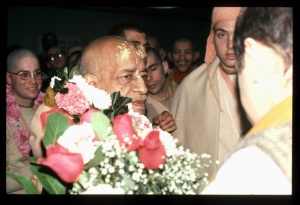SB 6.1.28-29: Difference between revisions
m (1 revision(s)) |
No edit summary |
||
| Line 1: | Line 1: | ||
{{info | {{info | ||
|speaker= | |speaker=Śukadeva Gosvāmī | ||
|listener=King | |listener=King Parīkṣit | ||
}} | }} | ||
[[Category:Srimad-Bhagavatam - Canto 06 Chapter 01]] | |||
[[Category:Bhagavatam Verses Spoken by Sukadeva Gosvami - Vanisource|060128]] | |||
<div style="float:left">'''[[Srimad-Bhagavatam]] - [[SB 6|Sixth Canto]] - [[SB 6.1: The History of the Life of Ajamila|Chapter 1: The History of the Life of Ajāmila]]'''</div> | |||
<div style="float:right">[[File:Go-previous.png|link=SB 6.1.27]] '''[[SB 6.1.27]] - [[SB 6.1.30]]''' [[File:Go-next.png|link=SB 6.1.30]]</div> | |||
{{RandomImage}} | |||
==== TEXTS 28-29 ==== | ==== TEXTS 28-29 ==== | ||
<div | <div class="verse"> | ||
sa pāśa-hastāṁs trīn dṛṣṭvā | :sa pāśa-hastāṁs trīn dṛṣṭvā | ||
puruṣān ati-dāruṇān | :puruṣān ati-dāruṇān | ||
vakra-tuṇḍān ūrdhva-romṇa | :vakra-tuṇḍān ūrdhva-romṇa | ||
ātmānaṁ netum āgatān | :ātmānaṁ netum āgatān | ||
dūre krīḍanakāsaktaṁ | |||
putraṁ nārāyaṇāhvayam | :dūre krīḍanakāsaktaṁ | ||
plāvitena svareṇoccair | :putraṁ nārāyaṇāhvayam | ||
ājuhāvākulendriyaḥ | :plāvitena svareṇoccair | ||
:ājuhāvākulendriyaḥ | |||
</div> | </div> | ||
| Line 20: | Line 27: | ||
==== SYNONYMS ==== | ==== SYNONYMS ==== | ||
<div | <div class="synonyms"> | ||
''saḥ''—that person (Ajāmila); ''pāśa-hastān''—having ropes in their hands; ''trīn''—three; ''dṛṣṭvā''—seeing; ''puruṣān''—persons; ''ati-dāruṇān''—very fearful in their features; ''vakra-tuṇḍān''—with twisted faces; ''ūrdhva-romṇaḥ''—with hair standing on the body; ''ātmānam''—the self; ''netum''—to take away; ''āgatān''—arrived; ''dūre''—a short distance away; ''krīḍanaka-āsaktam''—engaged in his play; ''putram''—his child; ''nārāyaṇa-āhvayam''—named Nārāyaṇa; ''plāvitena''—with tearful eyes; ''svareṇa''—with his voice; ''uccaiḥ''—very loudly; ''ājuhāva''—called; ''ākula-indriyaḥ''—being full of anxiety. | |||
</div> | </div> | ||
| Line 27: | Line 34: | ||
==== TRANSLATION ==== | ==== TRANSLATION ==== | ||
<div | <div class="translation"> | ||
Ajāmila then saw three awkward persons with deformed bodily features, fierce, twisted faces, and hair standing erect on their bodies. With ropes in their hands, they had come to take him away to the abode of Yamarāja. When he saw them he was extremely bewildered, and because of attachment to his child, who was playing a short distance away, Ajāmila began to call him loudly by his name. Thus with tears in his eyes he somehow or other chanted the holy name of Nārāyaṇa. | Ajāmila then saw three awkward persons with deformed bodily features, fierce, twisted faces, and hair standing erect on their bodies. With ropes in their hands, they had come to take him away to the abode of Yamarāja. When he saw them he was extremely bewildered, and because of attachment to his child, who was playing a short distance away, Ajāmila began to call him loudly by his name. Thus with tears in his eyes he somehow or other chanted the holy name of Nārāyaṇa. | ||
</div> | </div> | ||
| Line 34: | Line 41: | ||
==== PURPORT ==== | ==== PURPORT ==== | ||
<div | <div class="purport"> | ||
A person who performs sinful activities performs them with his body, mind and words. Therefore three order carriers from Yamarāja came to take Ajāmila to Yamarāja's abode. Fortunately, even though he was referring to his son, Ajāmila chanted the four syllables of the hari-nāma Nārāyaṇa, and therefore the order carriers of Nārāyaṇa, the Viṣṇudūtas, also immediately arrived there. Because Ajāmila was extremely afraid of the ropes of Yamarāja, he chanted the Lord's name with tearful eyes. Actually, however, he never meant to chant the holy name of Nārāyaṇa; he meant to call his son. | A person who performs sinful activities performs them with his body, mind and words. Therefore three order carriers from Yamarāja came to take Ajāmila to Yamarāja's abode. Fortunately, even though he was referring to his son, Ajāmila chanted the four syllables of the ''hari-nāma'' Nārāyaṇa, and therefore the order carriers of Nārāyaṇa, the Viṣṇudūtas, also immediately arrived there. Because Ajāmila was extremely afraid of the ropes of Yamarāja, he chanted the Lord's name with tearful eyes. Actually, however, he never meant to chant the holy name of Nārāyaṇa; he meant to call his son. | ||
</div> | </div> | ||
__NOTOC__ | |||
<div style="float:right; clear:both;">[[File:Go-previous.png|link=SB 6.1.27]] '''[[SB 6.1.27]] - [[SB 6.1.30]]''' [[File:Go-next.png|link=SB 6.1.30]]</div> | |||
__NOTOC__ | |||
__NOEDITSECTION__ | |||
Revision as of 08:27, 11 May 2021

A.C. Bhaktivedanta Swami Prabhupada
TEXTS 28-29
- sa pāśa-hastāṁs trīn dṛṣṭvā
- puruṣān ati-dāruṇān
- vakra-tuṇḍān ūrdhva-romṇa
- ātmānaṁ netum āgatān
- dūre krīḍanakāsaktaṁ
- putraṁ nārāyaṇāhvayam
- plāvitena svareṇoccair
- ājuhāvākulendriyaḥ
SYNONYMS
saḥ—that person (Ajāmila); pāśa-hastān—having ropes in their hands; trīn—three; dṛṣṭvā—seeing; puruṣān—persons; ati-dāruṇān—very fearful in their features; vakra-tuṇḍān—with twisted faces; ūrdhva-romṇaḥ—with hair standing on the body; ātmānam—the self; netum—to take away; āgatān—arrived; dūre—a short distance away; krīḍanaka-āsaktam—engaged in his play; putram—his child; nārāyaṇa-āhvayam—named Nārāyaṇa; plāvitena—with tearful eyes; svareṇa—with his voice; uccaiḥ—very loudly; ājuhāva—called; ākula-indriyaḥ—being full of anxiety.
TRANSLATION
Ajāmila then saw three awkward persons with deformed bodily features, fierce, twisted faces, and hair standing erect on their bodies. With ropes in their hands, they had come to take him away to the abode of Yamarāja. When he saw them he was extremely bewildered, and because of attachment to his child, who was playing a short distance away, Ajāmila began to call him loudly by his name. Thus with tears in his eyes he somehow or other chanted the holy name of Nārāyaṇa.
PURPORT
A person who performs sinful activities performs them with his body, mind and words. Therefore three order carriers from Yamarāja came to take Ajāmila to Yamarāja's abode. Fortunately, even though he was referring to his son, Ajāmila chanted the four syllables of the hari-nāma Nārāyaṇa, and therefore the order carriers of Nārāyaṇa, the Viṣṇudūtas, also immediately arrived there. Because Ajāmila was extremely afraid of the ropes of Yamarāja, he chanted the Lord's name with tearful eyes. Actually, however, he never meant to chant the holy name of Nārāyaṇa; he meant to call his son.